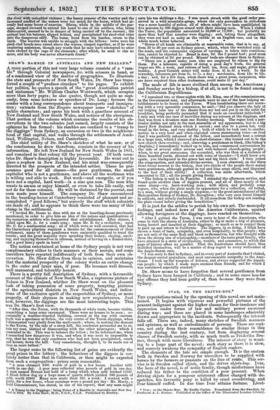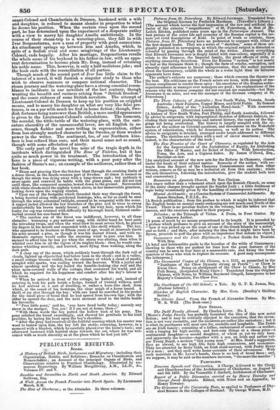IVAR, OR THE as.JuTa - Box.*
Tits expectations raised by the opening of this novel are not main- - tained. It begins with vigorous and powerful pictures of the peasant indignant against the higher classes for their insolence and oppression under forms of law and military power exercised during war ; and these are placed in some landscapes admirably drawn and appropriate to the incidents. Subsequently the interest falls off. There are, indeed, many sketches of Swedish manners and opinions, as well as embodiments of persons. These are curi- ous, not only from their resemblance to similar things in this country during the last century, but from displaying several classes of Swedish society, with as much truth asTrederika Bre- mer, though with more literalness. The interest of story is want- ing to a large part of the novel; such story as there is is slow, and scarcely awakens the sympathy of English readers.
The elements of the tale are simple enough. 'It is the custom both in Sweden and Norway for travellers to be supplied with horses by the farmers or peasants on the line of route. This ser- vice is in Sweden called skjues, and the driver skjuts-boy. Ivar, the hero of the novel, is of noble family, though misfortunes have reduced his father to the condition of a poor peasant. When driving skjuts for a pompous aristocrat officer charged with de- spatches, his favourite pony is killed by cruel overdriving, and Ivar himself cuffed. In due time Ivar attains fortune. I jeut- • Ivar; or the Skjuts-Boy. y Emilie Darien. Translated from the Swedish, by Professor A. L. Krause. Published at the Office of the Illustrated London Library.
enant-Colonel and Chamberlain de Dressen, burdened with a wife and daughter, is reduced to means slender in proportion to what he deems his position. When the curtain rises upon the second
part, he has determined upon the experiment of a desperate outlay with a view to marry his daughter Amelia ambitiously. In the
course of their steam-trip to a watering-place, they fall in with Ivar Borgenstierna, now a man of property with good connexions. An attachment springs up between him and Amelia, which, in spite of a foolish rival and some misgivings of the Lieutenant- Colonel, ends happily. After his marriage, Borgenstierna recalls the whole scene of his boyhood to his father-in-law, with an appa- rent determination to become plain Mr. Borg, instead of retaining his noble name. This, however, is only a half-malicious joke; and the book ends with the reconciliation of all parties.
Though much of the second part of Ivar has little claim to the interest of a novel, it will furnish a singular study to those who wish to observe manners or compare national character. The steam journey, and the watering-place have a strong essential resem- blance to incidents in our novelists of the last century, though wanting the breadth and raciness arising from "British freedom" and the comic richness of some British novelists. The attempt of lieutenant-Colonel de Dressen to keep up his position on crippled means, and to marry his daughter on what are very like false pre- tences, is on a par with much we find in home fiction; though, Swe- dish fortunes being narrower than British, a more sordid appearance is given to the Lieutenant-Colonel's calculations. The humours, the scandal, the tittle-tattle of the watering-place, with the cari- cature absurdity of the unsuccessful lover, are all English in es- sence, though feebler and more trifling in representation, either from less strongly marked character in the Swedes, or from weaker power in the writer. The sentiment, too, of our Northern kins- men is less refined than ours, and their moral sense not so sound, though with some affectation of nicety. The early part of the novel has none of the tragic depth in its incidents which distinguished The Bose of Tisleton, but it has quite as much power in its treatment. The introduction of the hero is a piece of vigorous writing, with a poor pony after the fashion of Sterne's ass; an example of the authoress, rather than of her book.
"Sharp and yiereing blew the October blast through the creaking limbs of a dense forest, in the South-western part of Sweden. At times it seemed as though the storm was dying away with a long-drawn sigh ; but suddenly it arose again and renewed its battle with the giant pines, and did not rest until these, like conquered enemies, bowed down to the ground. Surrounded with white clouds stood the nightly watch above, in her immoveable grandeur, looking down upon the waging combat. "Upon one of the footpaths which threaded their way through the forest, a being hurried along with quickened footsteps, who, as far as could be seen through the misty autumnal twilight, seemed to be congenial with the scene. A ragged jacket allowed the low branches of the pine and fir trees to sweep undisturbedly his brown manly breast ; and his wiry hair, upon which his busby fur cap was retained with difficulty by his rough hand, fluttered undis- turbed around his sun-burnt face.
"the careless son of the forest was indifferent, however, to all these obstacles : humming a gay national song, with skilful hand he bent aside the intruding twigs, and when the wind blew its most severe blast, he placed his fingers in his mouth and responded with a like shrill whistle. The boy, who appeared to be fourteen or fifteen years of age, would at intervals throw his arms around a pine, as though it was his dearest friend, and with en- thusiastic rapture would suffer the storming wind to pass over him. It seemed to afford him far less joy when the storm was abating, than when it whirled over him in all the vigour of its mightjrblasts : then he would com- mence whistling merrily, and hurried, more flying than walking, along the dark path. "A clear ray of the moon, which suddenly burst through the dark veil of clouds, lighted up objects that had before been in the shade ; and in a valley, a small cottage became visible, from the chimney of which a cloud of smoke, mingled with sparks, was curling toward the heavens. With a joyful and almost speaking nod the boy hailed the humble-looking clay roof and the
plain moss-covered walls of the cottage, that contained his world, and all which he required for his happiness and comfort after his day's labour in the forest.
"When he arrived in front of the cottage, he halted ; and, instead of entering it, took his path beside a hedge, formed of twisted willows, until he had arrived at a sort of dwelling, or rather a barn-like shed, from which, at the sound of his footsteps, the clear neigh of a horse issued. A thrill of joy shot through the boy : with one hand he searched in his pocket for the small piece of bread that he had spared from his own lips ; with the other he opened the door, and the next moment stood in the stable beside his favourite.
"'Poor little pony,' said he, you have fared badly today; scarcely any straw in the manger. Yes, yea! if I am not at home, then—' "With these words the boy patted the hollow back of his pony. The pony relished the bread exceedingly, and showed his gratitude to his kind provider, by laying his head upon the boy's shoulder. "After the pony had received all the faithful nursing which his master was wont to bestow upon him, the boy left the stable, returning, however, in a moment with a blanket, which he carefully placed over the horse's back; and afterward hastened with hurried steps towards the cot, where he was wel- comed with as much sincerity as at the place which he had just left."



























 Previous page
Previous page